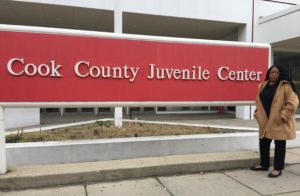This blog posting is part of an ongoing series following our founder Susan Burton as she tours prisons, jails and re-entry programs across America with her book, “Becoming Ms. Burton.”
I recently returned from Chicago where I visited with the boys of the Juvenile Temporary Detention Center. I was joined by Paul Pearson, a law student and regular volunteer at the facility, and Bella BAHHS, a Chicago native and activist. As I made my way through the facility during those two days, visiting with the various pods, I noticed that it was overpopulated with young Black males. I learned that 93 percent of the boys there were African American, even though Black people make up only 32 percent of the population of Chicago.
One pod that caught my attention housed four young men who were labeled as unmanageable by the staff. These boys ranged in age from 15-17. As I spoke with them, I was struck by the intelligence of the young men. They were all exceptionally bright. They told me that they had come from environments that offered them no hope whatsoever and that the things they did to try to make their lives better had landed them in jail.
I understood that hopelessness. As I cycled in and out of prison for nearly two decades, I was not once offered help, or treatment for my addiction. It was only after many years and many trips to prison that I decided enough was enough and found a private drug rehabilitation facility that allowed me to finally come back into society.
I only expected to visit with the boys for one day, but someone told me about the “Adopt a Pod” program. I arranged to come back the next day to share a meal with the four young men in the pod. They just about jumped out of their seats when I told them I would bring back ribs, chicken, and fries with “mild sauce” (a Chicago condiment).
During our meal, Paul, Bella and I assured the boys that the circumstances they were born into weren’t their fault, but they have to learn how to navigate them so they don’t end up in places like this. I let each boy know that I saw him as capable of having a great future. I could see that they were genuinely seeking guidance, which is something that they had never been given.
Our society is so quick to throw people away after they make a mistake. If only we realized the power of making someone feel like they’re cared about and important. At one point, one of the boys told us, “You make me feel human.” How heartbreaking that he hadn’t felt that way before.
I let the young men know that I was going to do what I could to stay in touch with them and offer support while they are in the detention center and after they are released. I left my business cards with the young men and asked them to keep in touch with me. I wanted to be able to provide them some type of ongoing encouragement and real resources.
Bella was as affected as I was by the experience of meeting these young men. She plans to start volunteering at the center to help the young men learn to express themselves through spoken word. I think it will be powerful for them to have a release for what they’re thinking and feeling.
I met the instructor of the barber school at the facility, Bobby Mattison, who also wants to provide resources for the boys when they are released. Standing Tall Against Recidivism (STAR) Barber College not only gives the young men their barber license, but also skills to help them become productive members of their communities.
The instructor would like to create a barbershop in the community that could be a safe landing spot for the young men after they serve their time. He shared with me that he hopes Common, a hip-hop artist who’s from Chicago, would visit the center and help them open a barbershop in the community. So Common, I am calling on you to come rescue these young men!
Before I left, one of the guards told me that our visit has been helpful for the boys as well as the guards. I am grateful that my book is resonating with people across age, gender, class and racial lines. The message is universal, and the people are getting it!


